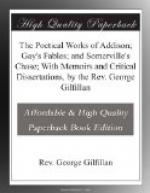On them he throws the regal cares:
And what mind they? Their own affairs.
If such rapacious hands he trust,
The best of men may seem unjust.
60
From kings to cobblers ’tis the same:
Bad servants wound their master’s fame.
In this our neighbours all agree:
Would the king knew as much as we.’
Here he stopp’d short. Repose they sought,
The peasant slept, the monarch thought.
The courtiers learned, at early dawn,
Where their lost sovereign was withdrawn.
The guards’ approach our host alarms,
With gaudy coats the cottage swarms.
70
The crown and purple robes they bring,
And prostrate fall before the king.
The clown was called, the royal guest
By due reward his thanks express’d.
The king then, turning to the crowd,
Who fawningly before him bow’d,
Thus spoke: ’Since, bent on private gain,
Your counsels first misled my reign,
Taught and informed by you alone,
No truth the royal ear hath known,
80
Till here conversing. Hence, ye crew,
For now I know myself and you.’
Whene’er the royal ear’s engross’d,
State-lies but little genius cost.
The favourite then securely robs,
And gleans a nation by his jobs.
Franker and bolder grown in ill,
He daily poisons dares instil;
And, as his present views suggest,
Inflames or soothes the royal breast.
90
Thus wicked ministers oppress,
When oft the monarch means redress.
Would kings their private subjects hear,
A minister must talk with fear.
If honesty opposed his views,
He dared not innocence excuse.
’Twould keep him in such narrow bound,
He could not right and wrong confound.
Happy were kings, could they disclose
Their real friends and real foes!
100
Were both themselves and subjects known,
A monarch’s will might be his own.
Had he the use of ears and eyes,
Knaves would no more be counted wise.
But then a minister might lose
(Hard case!) his own ambitious views.
When such as these have vexed a state,
Pursued by universal hate,
Their false support at once hath failed,
And persevering truth prevailed.
110
Exposed their train of fraud is seen;
Truth will at last remove the screen.
A country squire, by whim directed,
The true stanch dogs of chase neglected.
Beneath his board no hound was fed,
His hand ne’er stroked the spaniel’s head.
A snappish cur, alone caress’d,
By lies had banished all the rest.
Yap had his ear; and defamation
Gave him full scope of conversation.
120
His sycophants must be preferr’d,
Room must be made for all his herd:
Wherefore, to bring his schemes about,
Old faithful servants all must out.
The cur on every creature flew,
(As other great men’s puppies do,)
Unless due court to him were shown,
And both their face and business known,
No honest tongue an audience found:
And what mind they? Their own affairs.
If such rapacious hands he trust,
The best of men may seem unjust.
60
From kings to cobblers ’tis the same:
Bad servants wound their master’s fame.
In this our neighbours all agree:
Would the king knew as much as we.’
Here he stopp’d short. Repose they sought,
The peasant slept, the monarch thought.
The courtiers learned, at early dawn,
Where their lost sovereign was withdrawn.
The guards’ approach our host alarms,
With gaudy coats the cottage swarms.
70
The crown and purple robes they bring,
And prostrate fall before the king.
The clown was called, the royal guest
By due reward his thanks express’d.
The king then, turning to the crowd,
Who fawningly before him bow’d,
Thus spoke: ’Since, bent on private gain,
Your counsels first misled my reign,
Taught and informed by you alone,
No truth the royal ear hath known,
80
Till here conversing. Hence, ye crew,
For now I know myself and you.’
Whene’er the royal ear’s engross’d,
State-lies but little genius cost.
The favourite then securely robs,
And gleans a nation by his jobs.
Franker and bolder grown in ill,
He daily poisons dares instil;
And, as his present views suggest,
Inflames or soothes the royal breast.
90
Thus wicked ministers oppress,
When oft the monarch means redress.
Would kings their private subjects hear,
A minister must talk with fear.
If honesty opposed his views,
He dared not innocence excuse.
’Twould keep him in such narrow bound,
He could not right and wrong confound.
Happy were kings, could they disclose
Their real friends and real foes!
100
Were both themselves and subjects known,
A monarch’s will might be his own.
Had he the use of ears and eyes,
Knaves would no more be counted wise.
But then a minister might lose
(Hard case!) his own ambitious views.
When such as these have vexed a state,
Pursued by universal hate,
Their false support at once hath failed,
And persevering truth prevailed.
110
Exposed their train of fraud is seen;
Truth will at last remove the screen.
A country squire, by whim directed,
The true stanch dogs of chase neglected.
Beneath his board no hound was fed,
His hand ne’er stroked the spaniel’s head.
A snappish cur, alone caress’d,
By lies had banished all the rest.
Yap had his ear; and defamation
Gave him full scope of conversation.
120
His sycophants must be preferr’d,
Room must be made for all his herd:
Wherefore, to bring his schemes about,
Old faithful servants all must out.
The cur on every creature flew,
(As other great men’s puppies do,)
Unless due court to him were shown,
And both their face and business known,
No honest tongue an audience found:




